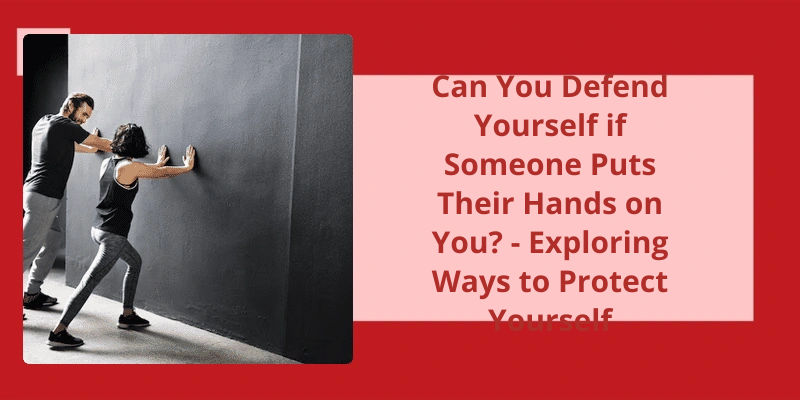However, if someone puts their hands on you in a more aggressive manner, such as grabbing you or shoving you, then you may have the legal right to defend yourself. It's important to note that the level of force you use in self-defense must be reasonable and proportional to the threat you’re facing. Additionally, the circumstances surrounding the situation, such as whether or not the aggressor is armed, may also affect your legal right to defend yourself. Knowing how to defend yourself can be valuable in potentially dangerous situations, but it's important to educate yourself on the laws and regulations regarding self-defense in your area in order to make informed decisions.
Is It Legal to Fight Someone Who Provokes You?
It’s important to note that the law varies by country and state, so it’s essential to research the specific laws that apply to your area. Generally speaking, most jurisdictions allow individuals to use reasonable force to protect themselves from imminent harm. This means that if someone is threatening to physically harm you or is in the process of doing so, you may be able to use force to defend yourself. However, it’s important to remember that the amount of force used must always be proportionate to the threat.
It’s also worth noting that in some situations, provocation can be considered a defense to a crime. For example, a person who was provoked into a fight may be able to argue that they were acting in self-defense or that their actions were justified due to the circumstances. However, this isn’t a blanket defense and will depend on the specific facts of the case.
Ultimately, the decision to physically retaliate against someone who’s provoked you is a personal one. While you may feel justified in reacting aggressively, it’s important to consider the potential legal consequences of your actions. Not only could you be charged with assault or battery, but you could also be held civilly liable for any harm caused to the other person.
In some cases, it may be more appropriate to walk away or seek help from law enforcement. Remember that just because someone has said or done something hurtful or offensive doesn’t give you the right to physically harm them. It’s important to maintain your composure and handle the situation in a mature and responsible manner.
While being provoked can be incredibly frustrating, it’s important to remember that physical violence is never the answer. If you believe that you’re in danger, you may be able to use force to protect yourself, but it’s important to do so in a proportionate and reasonable manner. Ultimately, it’s always best to try and deescalate the situation or seek assistance from authorities rather than resorting to violence.
The Legal Consequences of Using Excessive Force in Self-Defense.
- Loss of legal immunity
- Criminal charges for assault or murder
- Civil lawsuits and financial penalties
- Damage to personal reputation and standing in the community
- Possible imprisonment or loss of freedom
- Mental and emotional trauma from the incident
It’s important to understand the basic guidelines around touching someone before engaging in any physical activity or contact. While there are some general rules that apply, it’s also important to check your state’s specific laws to ensure you’re within your legal rights. With that in mind, let’s explore some of the key considerations when it comes to touching someone.
What Is the Law of Touching Someone?
However, there are certain circumstances where touching someone without their explicit consent is illegal. This is particularly true in cases of physical assault or sexual harassment. The concept of “battery” in criminal law refers specifically to the intentional touching of another person without their consent. This includes any level of force, from a light touch to a full-blown attack.
There are also civil laws that protect individuals from unwanted touching. These are often referred to as “assault and battery” laws. Victims of assault and battery are entitled to sue their attacker for damages, which can include compensation for medical bills, lost wages, and pain and suffering. In some cases, courts may also award punitive damages if the attackers conduct was especially egregious.
It’s also worth noting that the laws around touching are constantly evolving, particularly in areas related to sexual harassment. In recent years, many jurisdictions have expanded their definitions of sexual misconduct to include non-consensual touching. This has led to increased scrutiny of workplace relationships and a renewed emphasis on consent.
Ultimately, while there are some general principles around touching others, the specific laws vary widely depending on the situation and jurisdiction. If youre unsure about whats legal in a particular situation, it’s always best to err on the side of caution and get the other persons explicit permission before proceeding. This is particularly important in any situation where physical contact could be interpreted as aggressive or predatory, such as in the workplace or in a public space.
It’s unfortunate, but there are situations where someone could put their hands on you. In these scenarios, your immediate response should be to protect yourself. However, it’s important to remember that physical violence should always be a last resort. In this article, we’ll discuss some practical steps you can take to handle these types of situations without escalating them to violence.
What to Do if Someone Put There Hands on You?
If someone has put their hands on you, it can be a scary and overwhelming experience. Your first priority is to ensure your safety. This may mean physically removing yourself from the situation, finding a safe space or telling the person to stop touching you. It’s important to avoid escalating the situation, as it can quickly become dangerous. If possible, try to remain calm and assertive in your communication.
A simple, firm statement like “please remove your hands from me” can often be enough to communicate your boundaries. If the person persists despite your requests, it may be necessary to seek help from others or involve authorities. It’s important to note that you’ve the right to defend yourself, but it’s essential to avoid violence if possible, as it could cause more harm than good.
It’s also important to seek support and help after an incident like this. This may mean talking to a trusted friend or family member, seeking counseling or therapy, or contacting a professional organization that specializes in dealing with assault and harassment. It’s normal to feel shaken or traumatized by an experience like this, and getting the help and support you need is crucial for your well-being.
It’s also important to remember that youre not alone. Many people have experienced situations where someone has put their hands on them without their consent. There are resources available that can help you navigate the aftermath of the incident and provide you with the support you need.
In addition to seeking help and support, it’s also important to take steps to prevent future incidents from happening. This may mean being more assertive about your boundaries, avoiding situations where you feel unsafe, or learning self-defense techniques. It’s important to remember that you’ve the right to protect your own personal space and your own body.
Understanding the Different Types of Assault and Defining Consent
- Sexual Assault
- Assault with a Deadly Weapon
- Assault and Battery
- Aggravated Assault
- Simple Assault
- Verbal Assault
- Defining consent in relation to assault is the active, informed, and voluntary agreement to engage in a sexual activity.
It’s important to understand your legal rights when it comes to physical altercations. Many people believe that they’ve the right to defend themselves no matter what, but the law is much more complex than that. So, can you beat someone up if they touch you? The answer isn’t as simple as you might think.
Can You Beat Someone Up if They Touch You?
The law is very clear on this matter, and it’s important to understand that violence is never an acceptable solution to any problem. If someone touches you in a way that you don’t like, the appropriate response is to remove yourself from the situation and report the incident to the proper authorities. Getting into a physical altercation will only make matters worse, and could result in legal consequences for you.
It’s important to remember that everyone has the right to personal space and privacy, and touching someone without their consent is a violation of that right. However, that doesn’t mean that you’ve the right to hit someone who’s touched you. Rather, you should take steps to protect yourself and seek help if necessary.
If you feel threatened or unsafe, your first priority should be to leave the situation as quickly as possible. If you cant leave, then try to create a physical barrier between yourself and the other person, such as by putting a table or chair between you, or by standing near a door or window that you can quickly exit if needed.
If the other person continues to touch you or behave in an aggressive manner, then you may need to use physical force to defend yourself. However, this should always be a last resort, and you should always try to use the minimum amount of force necessary to protect yourself. Additionally, you should be aware of the legal consequences of your actions, and seek help from the appropriate authorities if needed.
Ultimately, the best way to avoid physical altercations is to stay calm, be aware of your surroundings, and avoid confrontations whenever possible. Remember that violence is never the answer, and that there are always other ways to address problems and conflicts. By staying safe and using good judgement, you can protect yourself and those around you from harm, and avoid unnecessary legal trouble.
What Are Some Techniques for Protecting Yourself Without Resorting to Physical Violence?
- Take self-defense classes
- Carry a personal alarm
- Be aware of your surroundings
- Trust your instincts
- Avoid dangerous areas or people
- Develop a safety plan
- Stay sober and clear-headed
- Use your voice and assertiveness
- Get to know your neighbors and community
- Stay informed about local crime
- Consider carrying pepper spray or a stun gun
Now that we’ve established that hitting someone with their consent isn’t considered assault, there are still some gray areas to consider. While a person may willingly ask someone to hit them, there are still potential legal and ethical implications to be aware of. Let’s take a closer look.
Is It Assault if Someone Asks You to Hit Them?
However, there are exceptions to this rule. If the person asking to be hit isn’t in a sound state of mind or is under duress, then their consent doesn’t count and hitting them would still be considered battery. Additionally, if the requested contact goes beyond what would be considered reasonable or safe, then it could potentially be classified as assault.
It’s important to note that just because someone consents to being hit doesn’t make it morally or ethically acceptable. It could indicate deeper issues such as low self-worth or a desire for pain as a coping mechanism. It’s important to approach these situations with care and sensitivity, and to never participate in anything you’re uncomfortable with.
If you find yourself in a situation where someone is continuously asking you to hit them, it might be helpful to seek out professional help. A therapist or counselor can provide guidance and support in navigating these types of situations and provide resources for healthy coping mechanisms.
While it may not be considered assault if someone asks you to hit them and you both consent, it’s important to consider the potential underlying issues involved and approach the situation with care. It’s never okay to engage in behavior that makes you uncomfortable or goes against your personal boundaries. Seeking out professional help can be beneficial for all parties involved.
The Psychology Behind Why Someone May Ask to Be Hit or to Engage in Consensual Violence.
This topic explores the reasons why an individual might ask to engage in consensual violence or be hit, from a psychological perspective.
Source: Can you legally punch someone if they dare you?..
Conclusion
If someone simply touches you, using deadly force to defend yourself wouldn’t be considered justifiable. It’s important to always assess the situation and try to de-escalate it before resorting to physical self-defense. Additionally, learning self-defense techniques and constantly practicing them can give you more confidence in potentially dangerous situations. Remember, the goal is to protect yourself without causing unnecessary harm to others.






